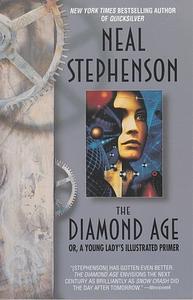You need to sign in or sign up before continuing.
Take a photo of a barcode or cover
adventurous
dark
emotional
funny
mysterious
tense
fast-paced
Plot or Character Driven:
A mix
Strong character development:
Yes
Loveable characters:
Complicated
Diverse cast of characters:
Yes
Flaws of characters a main focus:
Complicated
Another Stephensonian tour de force: multi-layered, intricately plotted and filled with memorable characters. A world that inhales technology and exhales change every minute. An almost present future, in which devices are as much part of human brain as the grey matter. But in spite of this techno-wonder, Neal Stephenson blends this technological, speedy, colorful life with a wonderful feeling of nostalgia.
Just finished re-reading the Diamond Age, which I probably read 20 years or so ago. Neal Stephenson is my favorite author and I've read practically everything he's written.
This time around, I'm a bit more critical and only give this book 4 of 5 stars. The creativity is amazing, the language, the research are fabulous! Neal is definitely able to imagine the future better than most authors.
Nanotechnology, virtual reality, the ascendency of Asia, the decomposition of the world into factions are all concepts that are dealt with beautifully.
The ending was not as satisfying as the first time around, but I still highly recommend this as a tour-de-force.
This time around, I'm a bit more critical and only give this book 4 of 5 stars. The creativity is amazing, the language, the research are fabulous! Neal is definitely able to imagine the future better than most authors.
Nanotechnology, virtual reality, the ascendency of Asia, the decomposition of the world into factions are all concepts that are dealt with beautifully.
The ending was not as satisfying as the first time around, but I still highly recommend this as a tour-de-force.
I originally read this book in May 2008. Here is my review from then:
I liked the first half of this book better, when it was still just "here are a lot of new ideas!" and wasn't concerned with tying up the plot. But it was still really great.
I really, really heart Neal Stephenson. He writes the most likable characters I have ever read. Hackworth is a Waterhouse, of course, and he can't ever seem to come up with more than one kickass female per book (I barely count Miranda, since she was in the book so rarely), but still, everybody is COOL, even the bad guys. Once again he described a lot of geography (China) that I wasn't able to picture in my head (just like London in the Baroque Cycle and Manila in [b:Cryptonomicon|816|Cryptonomicon|Neal Stephenson|http://d.gr-assets.com/books/1327931476s/816.jpg|1166797], but it doesn't really matter much.
So, if you haven't read this book, you should.
I re-read it in April 2013, because I have read a bunch of mediocre books lately and wanted to read something I knew I would enjoy. This fit the bill nicely. Partly I was thinking of Stephenson because Sean is reading Anathem, and partly maybe because the They Might Be Giants album Nanobots just came out.
I agree with my review of five (!) years ago.
I liked the first half of this book better, when it was still just "here are a lot of new ideas!" and wasn't concerned with tying up the plot. But it was still really great.
I really, really heart Neal Stephenson. He writes the most likable characters I have ever read. Hackworth is a Waterhouse, of course, and he can't ever seem to come up with more than one kickass female per book (I barely count Miranda, since she was in the book so rarely), but still, everybody is COOL, even the bad guys. Once again he described a lot of geography (China) that I wasn't able to picture in my head (just like London in the Baroque Cycle and Manila in [b:Cryptonomicon|816|Cryptonomicon|Neal Stephenson|http://d.gr-assets.com/books/1327931476s/816.jpg|1166797], but it doesn't really matter much.
So, if you haven't read this book, you should.
I re-read it in April 2013, because I have read a bunch of mediocre books lately and wanted to read something I knew I would enjoy. This fit the bill nicely. Partly I was thinking of Stephenson because Sean is reading Anathem, and partly maybe because the They Might Be Giants album Nanobots just came out.
I agree with my review of five (!) years ago.
adventurous
mysterious
medium-paced
Plot or Character Driven:
Plot
Strong character development:
Yes
Loveable characters:
Complicated
Diverse cast of characters:
Yes
I'd give this a five for the ideas, but it's a three because of the presentation. Half the time, and especially towards the end, I just didn't understand what was happening with the plot at all. Other stretches were fascinating, and there was a lot that was startlingly prescient.
It's strange how Neal Stephenson can write so well in some books -- and sustain it through long, long stories -- while in others the ideas and characters are all there but the stories just don't flow. I wonder if much of that comes from editing. I'm just glad these not-so-good ones are also not so long.
It's strange how Neal Stephenson can write so well in some books -- and sustain it through long, long stories -- while in others the ideas and characters are all there but the stories just don't flow. I wonder if much of that comes from editing. I'm just glad these not-so-good ones are also not so long.
The world building is great and the story is engaging, but I found it a very hard/dense read, felt like a chore at times.
Entertaining, brilliant, visionary, and sometimes kinda scary!
3.5 rounded up. Hard to know exactly how I feel about this book; there's always been something about the author's writing that doesn't sit well with me. I still haven't figured out what that is exactly.
I enjoyed this, all the same, for its many interesting ideas and involved plot. The ideas and world-building were probably its strongest point. But it didn't feel entirely cohesive, and many characters were barely fleshed out, or disappeared abruptly. The ending felt abrupt too. Could've done with an epilogue maybe.
I enjoyed this, all the same, for its many interesting ideas and involved plot. The ideas and world-building were probably its strongest point. But it didn't feel entirely cohesive, and many characters were barely fleshed out, or disappeared abruptly. The ending felt abrupt too. Could've done with an epilogue maybe.
Mankind has mastered nanotechnology and nation states have largely disappeared, ala [b:Snow Crash|61240297|Snow Crash|Neal Stephenson|https://i.gr-assets.com/images/S/compressed.photo.goodreads.com/books/1656932283l/61240297._SY75_.jpg|493634] or [b:Too Like the Lightning|26114545|Too Like the Lightning (Terra Ignota, #1)|Ada Palmer|https://i.gr-assets.com/images/S/compressed.photo.goodreads.com/books/1443106959l/26114545._SY75_.jpg|46061374] Diamond Age has a lot going for it. The world building is superb, the characters are great, and the plot keeps you guessing where it is going. Then at the 50% mark almost all of the previous dramatic tension goes out the window, and some new nebulous story-lines continue. One might compare it to the author's [b:Seveneves|22816087|Seveneves|Neal Stephenson|https://i.gr-assets.com/images/S/compressed.photo.goodreads.com/books/1449142000l/22816087._SY75_.jpg|42299347] where he does something similar, though in this case it isn't as drastic.
One other thing I'd like to mention is the use of language, particularly by the Neo-Victorians. Keep your dictionary handy, for lambent effulgences and crepuscular ablutions abound.
The old neighborhoods of Shanghai, Feedless or with overhead Feeds kludged in on bamboo stilts, seemed frighteningly inert, like an opium addict squatting in the middle of a frenetic downtown street, blowing a reed of sweet smoke out between his teeth, staring into some ancient dream that all the bustling pedestrians had banished to unfrequented parts of their minds.
One other thing I'd like to mention is the use of language, particularly by the Neo-Victorians. Keep your dictionary handy, for lambent effulgences and crepuscular ablutions abound.
The old neighborhoods of Shanghai, Feedless or with overhead Feeds kludged in on bamboo stilts, seemed frighteningly inert, like an opium addict squatting in the middle of a frenetic downtown street, blowing a reed of sweet smoke out between his teeth, staring into some ancient dream that all the bustling pedestrians had banished to unfrequented parts of their minds.




